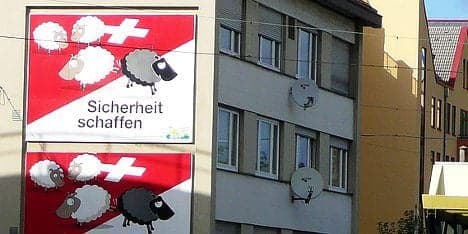SVP launches new foreign criminals plan

Switzerland's far-right SVP has launched a new initiative calling for the deportation of foreign criminals at the same time as a pre-election projection suggests the party will retain power later this month.
The ultra-conservative party, Switzerland's largest, added fresh impetus to its election campaign this weekend by bringing up its favourite topic: immigration.
At a conference in Aargau on Saturday, party leaders said the objective of the second deportation initiative is to force the Federal Council to put into practice a constitutional amendment that was previously supported by a majority of Swiss in a November 28th 2010 referendum.
But Social Democratic Party justice minister, Simonetta Sommaruga, and the study group she commissioned, rejected the inclusion of “automatic deportation” for criminal foreigners when they passed the initiative into law.
The new text proposed by the SVP initiative will be clearer and more direct, making it impossible for the consequences to be disputed once written into the constitution.
In an interview with newspaper Le Temps, SVP leader Christoph Blocher said his party is the only one that “addresses the real problems” of Switzerland. In his view, the most important issues are immigration and the free movement of people.
So far, the hardline approach the party has taken in recent years on hot-button topics such as foreigners' rights and anything related to the European Union, has borne fruit.
In a first simulation of the likely make-up of parliament after the elections, newspaper NZZ am Sonntag showed the SVP keeping its current 62 seats in Bern, while the Socialist Party will gain two seats, rising to 45. The projection, based on research by political scientist Michael Hermann, also indicated that the Greens will lose two members, but the liberal FPD will suffer the worst blow – its representation dropping by a quarter (down to 27 from 35 seats).
Hermann’s calculations are not based solely on opinion polls, but also on previous cantonal election results and party alliances in the regions.
Join the conversation in our comments section below. Share your own views and experience and if you have a question or suggestion for our journalists then email us at [email protected].
Please keep comments civil, constructive and on topic – and make sure to read our terms of use before getting involved.
Please log in here to leave a comment.